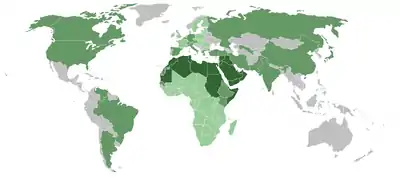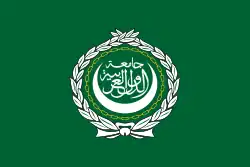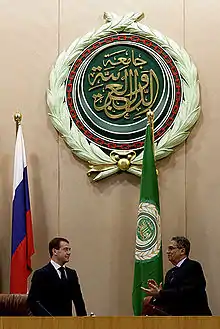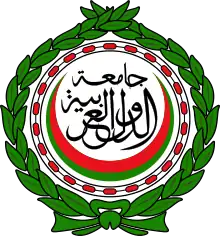Foreign relations of the Arab League
The Arab League was founded in 1945, has 22 members and four observer members: Brazil, Eritrea, India and Venezuela.[1]
The Arab League itself is an observer in several international and regional organizations, such as the Non-Aligned Movement, the African Union, the United Nations, and has observed several summits of ASEAN.

| Part of a series on |
| Arab League |
|---|
 |
Neighboring States Policy
The Arab Neighboring States Policy is a proposal that was agreed on in the 22nd Arab League Summit in the Libyan City of Sirte, where the Secretary General Amr Moussa, Proposed creating the ANP (Arab Neighborhood Policy), to increase relations with Neighboring Countries of the Arab League States.
Countries that are predicted to be included in the ANP are Turkey, Iran, Pakistan, Cyprus, Greece, Italy, France, Spain, Senegal, Mali, Niger, Chad, Ethiopia, Kenya and Eritrea.
Multilateral relations
African Union
Formal relations between the two organizations started in 1977, when they announced their cooperation in financial, political and economic issues. With a summit between both organizations in Cairo that same year, they have signed several treaties aimed at improving cooperation.
On 16 January 2008, the Arab League sent a Delegation to the AU Headquarters in Addis Ababa, Ethiopian Capital, to gain experience from the African Security and Peace Council, which has been in work since 2004, the Arab League's decision to create an Arab Peace and Security Council was taken following the 2006 Lebanon war, in a procedure to place Peace keeping forces into Darfur, South Lebanon, and Somalia, other regions such as Iraq have not been announced or spoken of, since the Arab League's official Stance denounces any form of Foreign troops in Iraq, to maintain stability.
Eritrea
In 2003, Eritrea became the first Observer in the Pan-Arab Body, opening the door for it to become a prospect member in the League, while the Current Eritrean President has denied any plans for joining the League in the Near Future, due to its lack of efficiency.[2]
ASEAN
By January 2008 the AL and ASEAN had no significant relations, but the Arab League's Economic Council decided to Expand economic cooperation with Regional blocks, to benefit from their Economic experience and development, and started contacting the Association of South East Asian Nations (ASEAN), to build better relations and to increase investments from this region, and to learn from their Economic Achievements to be applied in the League. which will help the Arab States to increase inner investments and inner imports and exports, the Head of the Delegation, also secretary General of the Arab Council for Economic Development (ACED), Dr. Ahmed Jweily to sign a treaty of understanding and cooperation Between the Two Organizations. The Delegation concluded the visit announcing that three New Arab Unions are to be proposed for the Council's 87th summit in its following Period.
European Union
The Arab League and European Union have shared relations since the EU's development into a more political power rather than an economical one, in the 19th summit of the Arab League in Saudi Arabia, Javier Solana attended the summit, giving the EU's full support to the Arab League's Peace Initiative of 2002. Following this summit, he had several meetings with Palestinian President Mahmoud Abbas and the Arab League Secretary General Amr Moussa. In the summit, he addressed the Arab Leaders:
"once again we find ourselves together, the European Union and the Arab League, once again we have an opportunity to re-affirm our joint commitment to the values of civilisation that we share, more than ever Europeans and Arabs have to face common challenges, I am confident that we will find new ways to improve our cooperation"[3]
France
France has been historically close with the Arab world, starting with the Maghreb region, and the Near East, but France's closest relations are considered to be with Algeria, where it served as a colony of France for around 200 years, with a bloody independence war, relations today are good, France is considered to have the Cordialest relations with All Arab states, with a large Arab population in France counting to around 03 million Arabs, France holds the Biggest Arab Cultural center outside the Arab league.
- Algeria
- Lebanon
Since the end of the Lebanese civil war, France has played an active role in the reconstruction of Lebanon. The Hexagon is the leading investor in the Country of Ceders.
- Libya
Libya developed particularly close relations with France after the June 1967 War, when France relaxed its arms embargo on nonfront-line Middle East combatants and agreed to sell weapons to the Libyans. In 1974 Libya and France signed an agreement whereby Libya exchanged a guaranteed oil supply for technical assistance and financial cooperation.
Latin America

Relations between the Arab League and the Union of South American Nations (USAN), have only been established in recent times. The AL Secretary General Amr Moussa has stated that it was time for the Arab League and Latin America to seek strong relations. There are over 20 million Arabs living in Latin America, with Brazil containing over half of that number. As a result, President Luiz Inácio Lula da Silva was particularly vocal in efforts to improve relations.
The Arab-Latin American relations are concentrated mainly on Energy and Trade, strengthening ties between the two regions. In May 2005, the first South American-Arab Countries Summit (ASPA) was held in Brazil, with 34 countries attending to discuss trade and energy. Arab and Latin American economies are complementary. Latin America has developed high-tech skills and industries that will find ready markets in the Arab world as will its agricultural production. But Latin America is also energy-hungry and a ready market for Arab oil and downstream petrochemicals. They also have other common interests, not just a desire to see the elimination of the subsidies that allow European and American farmers to destroy the livelihoods of their counterparts elsewhere in the world. In an increasingly global economy, both want to avoid domination by the multinationals.
Yet the summit remained focused on politics rather than economics, with a joint call on Israel to dismantle settlements, concern about US sanctions against Syria, a call for UN reform, and Arab support for Argentina's position on the Falkland Islands. Developing business relations between the Arab world and South America will provide an invaluable balance to both regions' overdependence on Europe, the U.S. and Japan for imports and expertise.[4]
Since many countries began to recognize Jerusalem as Israel's capital following Donald Trump's lead in 2017, many Latin American countries began to shift stance. When Guatemala recognized Jerusalem as the capital of Israel, the Arab League has cut ties with the country in 2018.[5]
Brazil
Brazil was admitted as an observer to the Arab League in 2002[6] or 2003.[7] The country has a strong Arab heritage, with over 12 million inhabitants of Arabic descent, many of them from Lebanon. The first Summit of South American and Arab Countries (ASPA)[8] was held in Brazil in May 2005, with 34 countries attending.
Bilateral relations
India
Being conferred observer status in 2007, India was the first member to enter the League although it does not have an Arab community, neither does it have an indigenous Arabic speaking population. It does, however have a sizeable number of people claiming Arab descent. Trade between India and Arab League members was valued at US$30 billion in 2007.[9] India's major exports to Arab League countries are chemicals, automobiles, machinery, foodstuff and other fast moving products, while it is a large importer of Arab oil and gas. India also has a large diaspora in the Arab League countries of about 05 million, of which some 20% are professionals.[10]
Oman and India enjoy particularly good relations, an example being; both countries exchange ship visits on a regular basis.[11] Recently, Oman has granted India berthing rights for Indian naval ships.[12][13] The Indian navy has also been training Omani naval forces for many years.[14]
Qatar is the only other country in the Arab League, apart from Oman to have a significant military relationship with India.[12] The pact guarantees Qatar of Indian intervention in case Qatar's interests are threatened.[14] Naval officers from Qatar, like Oman train in India under the Indian Navy's institutes. India also has some military ties with Kuwait and the UAE, primarily centered in the naval sphere, frequently exchanging goodwill naval visits.[15] The UAE has been seeking India's assistance in setting up a submarine arm and hydgrographic survey and coastal zone management.[16] In addition the UAE has evinced interest in training its naval personnel in India[16]
Some Arab League members, namely the UAE have also voiced their support pertaining to deploying Indian troops in Iraq, although New Delhi has not decided on this matter. Some Arab League members have also voiced its support for India to be conferred a permanent seat on the UN Security Council.[17] India was among the first countries to recognize Palestine when it was proclaimed in November 1988. In 2011, India confirmed that it will support a Palestinian bid for membership of the United Nations at a meeting of the General Assembly.[18]
Iran
Iranian-Arab relations have always been very mixed. Within the Middle East historical conflicts have always colored neighbouring Arab countries' perceptions about Iran. At times peacefully coexisting, while at other times in bitter conflict. North African Arabs from have for the larger part enjoyed closer relations with Iran due to limited historical connection between them and Iran.
Israel
Only six Arab States recognize Israel: Egypt, Jordan, United Arab Emirates, Bahrain, Sudan and Morocco. though these relations are not normal and contain inherent problems. Relations with Israel have deteriorated, especially after the last Gaza War, where Mauritania had suspended its relations with Israel.[19]
Pakistan
China
The recent economic boom in the People's Republic of China has led to an increased demand for oil and other raw petroleum products, much of which has been supplied by member states of the Arab League. Chinese-Arab relations in the past few years have increased with the institution of several Arab-Chinese business forums, conferences and meetings to increase trade and cooperation in recent years. China is the second-largest financial investor in Sudan following the other members of the Arab League, and as a result a majority of Sudan's production of petroleum is sent overseas to China. Foreign ties have also been made with the Arab League states of Morocco, Algeria, Egypt, Iraq and Syria in order to further invest in petroleum production in the Middle East and North Africa.
As of 2008, the Arab League and the People's Republic of China have agreed to create an annual forum between the two parties in order to discuss matters of economics, trade and environmental studies. In 2009, the forum was expanded to also include the discussion of various nuclear projects.
Russia
Arab Russian relations goes far since the Khazars and their wars with the Arab Empire, but has flourished most under the Soviet Union, with the Communist Union of Soviet Socialist Republics' support for several Socialist Arab regimes against the Capitalist United States during the cold war, regimes like Nasser's Egypt and the Baathist regimes of Syria and Iraq, as well as other Socialist regimes in Libya and South Yemen. After the end of the cold war and the establishment of the Russia Federation, new ties have been made. Russia with its strong diplomatic relations with Arab States from the Soviet Era, is trying to regain its strength by supporting their causes, especially in the Security Council.

Turkey
Turkey has expressed desires for an observer status in the League, but has been refused for several political reasons. One of the reasons for refusals came from Iraq and Syria due to the Turkish Water Projects on the Tigris and Euphrates rivers, especially the Atatürk Dam. Also the Hatay Province's choice of self-annexation to Turkey in 1939 was never recognized by Syria, which continues to show the Hatay Province of Turkey as part of Syria's territory in its maps.
Today, Turkey has improved relations with Egypt, Saudi Arabia, the United Arab Emirates, and Tunisia. It also functions as the main broker in the Israeli-Syrian Peace process. However, a primary concern for Turkey stems from the possibility of an independent Kurdish state arising from a destabilized Iraq. Turkey is currently fighting a war against Kurdish insurgents on its own soil, in which an estimated 37,000 people have lost their lives.
United States
The United States' relationship with the Arab World prior to the Second World War was limited. Moreover, in comparison to European powers such as Britain and France which had managed to colonize almost all of the Arab World after defeating the Ottoman Empire in 1918, the United States was popular and respected among the Arabs, for having brought modern medicine, and setting up educational institutions in several Arab nations. The US had also provided the Arab World with highly skilled petroleum engineers. Thus, there were some connections which were made between the United States and the Arab World, before the Second World War. Other examples of corporations between the US and the Arab World are the Red Line Agreement signed in 1928 and the Anglo-American Petroleum Agreement signed in 1944. Both of these agreements were legally binding and reflected an American interest in control of Arab and Middle Eastern energy resources, namely oil, and moreover reflected an American security imperative to prevent the (re)emergence of a powerful regional rival. The Red Line Agreement had been part of a network of agreements made in the 1920s to restrict supply of petroleum and ensure that the major [mostly American] companies...could control oil prices on world markets. The Red Line agreement governed the development of Arab oil for the next two decades. The Anglo-American Petroleum Agreement of 1944 was based on negotiations between the United States and Britain over the control of Arab and Middle Eastern oil.
Uzbekistan
Arab League relations with Uzbekistan have been almost nonexistent until 2007. Then the Arab League Secretary General Amr Moussa and the Uzbek president Islam Karimov have met to carry on discussions held previously in Cairo, for more Arab cooperation with Central Asia and more Central Asian support for Arab causes, such as Iraq, Sudan and Palestine.[20]
References
- "The Arab League, on the International Democracy Watch website". Archived from the original on 2011-08-18. Retrieved 2011-05-23.
- "Archived copy". Archived from the original on 2010-03-31. Retrieved 2010-02-13.CS1 maint: archived copy as title (link)
- "Summary of remarks by Javier SOLANA, EU High Representative for CFSP, at the 19th Arab League Summit. Riyadh, 28 March 2007" (PDF). Council of the European Union. Retrieved 2007-10-30.
- "New centre to boost Middle East-Latin America investments". Thaindian News. Thaindian.com Company Limited. 23 February 2008. Retrieved 23 June 2012.
- https://www.middleeastmonitor.com/20180524-arab-league-cancels-deals-with-guatemala-over-jerusalem-embassy-move/
- "L'influence des BRIC en Méditerranée", by Sébastien Abis, Mediterranean Yearbook 2010, Barcelona: Institut Europeu de la Mediterrània, 2011.
- "Quiénes son los Árabes? Breve perfil sociológico e histórico", by Abdelmalik Hamza, Alif Nun No. 76, November 2009, Madrid: Kálamo Libros, 2009. In Spanish
- "Summit of South American-Arab Countries, Cúpula América do Sul-Países Árabes, Cumbre América del Sur-Países Árabes". Archived from the original on 2012-03-09. Retrieved 2011-05-23.
- ASHOK B SHARMA (2 December 2008). "India-Arab trade to rise to $100 bn". The Financial Express. The Indian Express Limited. Retrieved 23 June 2012.
- "Indo-Arab trade can touch $100 b". Business Line. The Hindu Business Line. 3 December 2008. Retrieved 23 June 2012.
- "India activates first listening post on foreign soil: radars in Madagascar". The Indian Express. The Indian Express Limited. 17 July 2008. Retrieved 23 June 2012.
- "Indian Naval ships to arrive in Kuwait". Kuwait Times. Kuwait Times Newspaper. 11 August 2007. Retrieved 23 June 2012.
- http://www.indianexpress.com/news/India-activates-first-listening-post-on-foreign-soil:-radars-in-Madagascar/205416/
- "India security deal with Qatar does not involve stationing troops: Official". Zee News. Zee News Limited. 11 November 2008. Archived from the original on 13 August 2012. Retrieved 23 June 2012.
- http://www.kuwaittimes.net/read_news.php?newsid=NjM4NDM3MjY1
- http://in.rediff.com/news/2006/jan/03uae.htm
- "India's voice can help Middle East peace: Arab League". RxPG News. RxPG Medical Solutions Private Limited. 10 May 2007. Retrieved 23 June 2012.
- "India to back Palestinian bid for U.N. membership". The Hindu. Chennai, India. 17 September 2011.
- "Qatar, Mauritania cut ties with Israel". BayBek, Voice of a Nation. www.en.baybak.com. 17 January 2009. Retrieved 23 June 2012.
- League of Arab States Archived 2007-09-30 at the Wayback Machine (Arabic)
